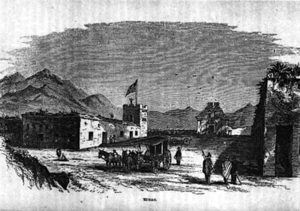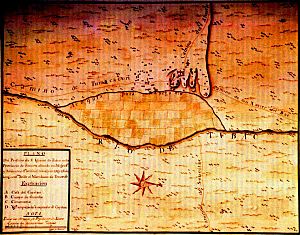Presidio San Ignacio de Tubac facts for kids
Quick facts for kids Fort Tubac |
|
|---|---|
| Tubac, Arizona | |

Tubac as a United States Army post in 1869
|
|
| Coordinates | 31°36′41″N 111°02′45″W / 31.611389°N 111.045833°W |
| Type | Army post |
| Site information | |
| Controlled by | Arizona |
| Condition | tourist attraction |
| Site history | |
| Built | 1752 |
| Built by | Spain |
| In use | 1752–1886 |
| Battles/wars | Apache–Mexico Wars Apache Wars American Civil War |
| Garrison information | |
| Past commanders |
Juan Bautista de Anza Juan Fernandez Carmona Granville H. Oury |
| Occupants | Spanish Army Mexican Army United States Army Confederate States Army |
The Presidio of San Ignacio de Túbac, also known as Fort Tubac, was an old Spanish fort. The Spanish Army built it in 1752 in what is now Tubac, Arizona. Today, you can still see its ruins at the Tubac Presidio State Historic Park.
Contents
A Look Back at Fort Tubac
The Spanish Era: Building the Fort
The presidio was home to about fifty cavalry (soldiers on horseback) and infantry (soldiers on foot). Their job was to protect Spanish towns and missions. These settlements were located in the valley of the Santa Cruz River.
By 1766, the fort had 51 officers and soldiers. A small town of forty families grew up around the fort. In 1774, Captain Juan Bautista de Anza was in charge of Tubac. He led an important trip to explore a land route from the Santa Cruz Valley all the way to California.
In 1775, the Spanish changed how they defended their frontier. The soldiers from Tubac moved about forty miles north. They went to a new spot in what is now downtown Tucson, Arizona. There, they built the Presidio San Agustín del Tucsón in 1775. This was done under the orders of Captain Hugo Oconor.
Even though the main group moved, a new group of soldiers soon formed at Tubac. These soldiers fought against the Apaches for many years. This continued until Mexico fought for its independence from Spain.
In 1775 and 1776, Captain de Anza led 240 settlers. They traveled from San Miguel de Horcasitas in Mexico to Monterey, California. After leaving the settlers in Monterey, de Anza kept going north. He reached what is now San Francisco. There, he picked out places for a mission and another fort.
By the early 1800s, Tubac's soldiers still protected the area from Apache raids. In 1804, the fort had two officers, two sergeants, and eighty-four men. Eight Spanish families and twenty Native American families also lived near the fort. They had many animals, like cattle, sheep, and horses. They also grew lots of wheat and corn each year.
The Mexican Era: Fort Tubac Changes Hands
Mexico gained independence from Spain in 1821. After this, the fort was left empty. The town around it also fell into ruins. When settlers from the United States arrived in the late 1840s, the fort was still abandoned.
For a short time in 1846, during the Mexican–American War, Tubac was home to over 200 Mexican soldiers. They had left Fort Tucson just before the American Mormon Battalion captured it. After the war, Tubac was abandoned again. It was later settled by Americans traveling for the California Gold Rush.
The American Era: A New Chapter
Tubac officially became an American settlement in 1853. This happened after the Gadsden Purchase. At this time, Tubac had several dozen people. It became a company town for a mining company owned by Charles Debrille Poston.
A small group of local fighters protected the fort. However, Apaches attacked it many times. The last attack was the Siege of Tubac in 1861. American fighters and townspeople were trapped inside the fort. They were saved by soldiers from the Confederate States. These soldiers were led by Captain Granville Henderson Oury from Fort Tucson.
Tubac was left empty again after this attack. But the United States Army moved back in during and after the American Civil War. They stayed there for several years. The two main original fort buildings were still standing in the 1900s. Today, they are popular tourist attractions.
Tubac was settled again in the 1880s. By 1886, when Geronimo surrendered, the Apache people were no longer a threat to settlers in Arizona. From that point on, the fort was no longer important for military strategy.
See also
 In Spanish: Presidio de San Ignacio de Tubac para niños
In Spanish: Presidio de San Ignacio de Tubac para niños
 | Misty Copeland |
 | Raven Wilkinson |
 | Debra Austin |
 | Aesha Ash |


